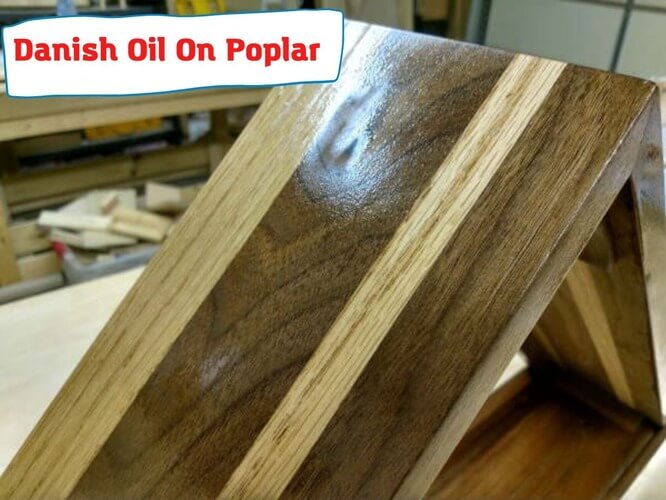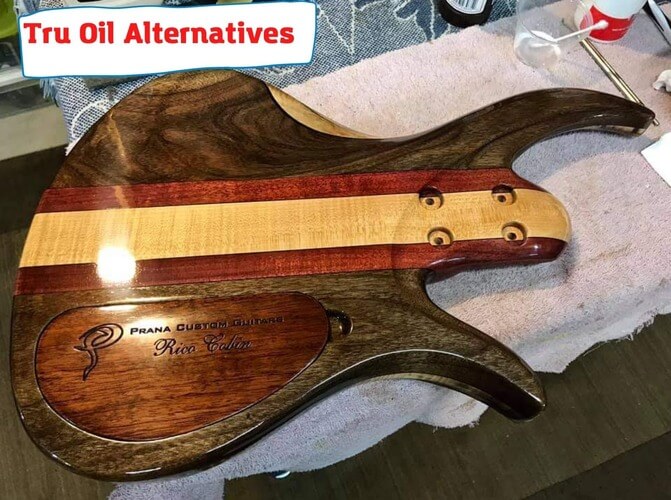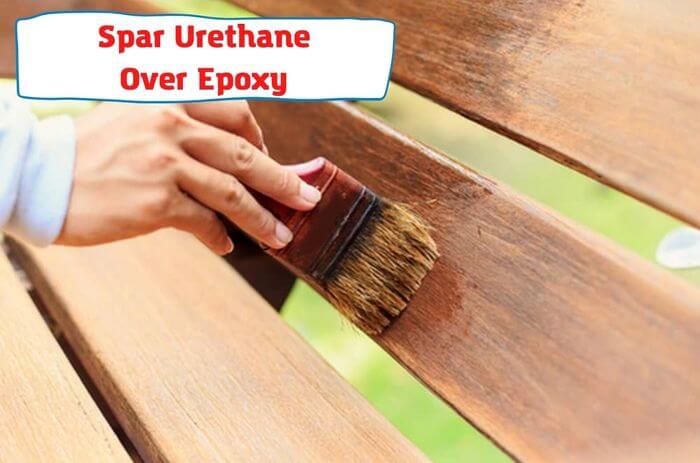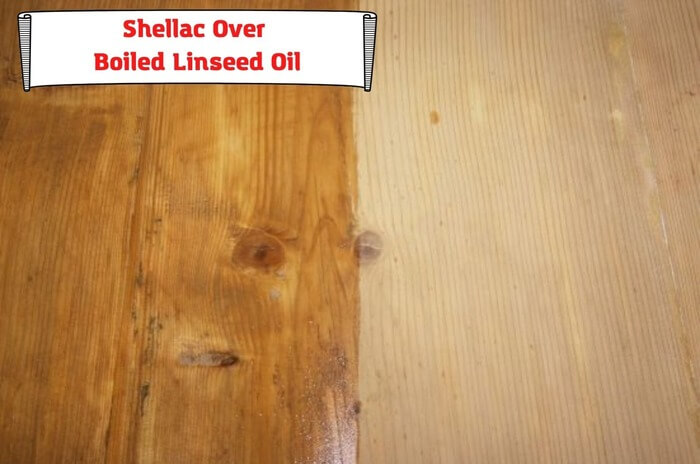The butcher block is used to handle food. It is traditionally used for the different meat processing methods that require a harder and broader platform. But it is also used for preparing other foods as it offers so many benefits compared to concrete countertops and chopping boards.
Since it is used for handling food, is it a good idea to finish the butcher block with polyurethane?
This article answers the question and discusses other important things you must know about polyurethane when dealing with food processing equipment.
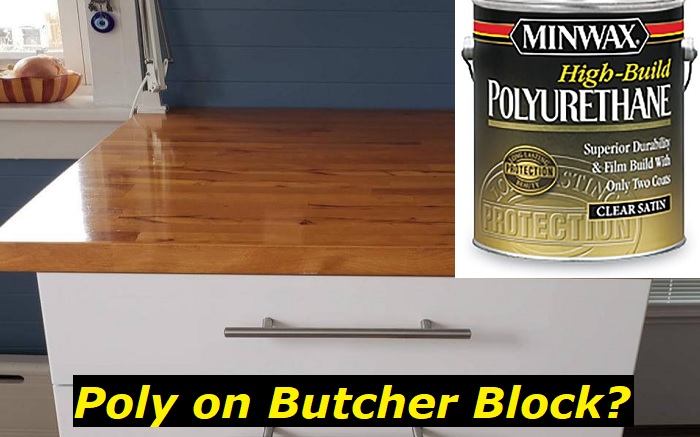
What Is Polyurethane?
Polyurethane is a class of polymers. It is a durable varnish made especially so that its tiny resin molecules will bind and stick tightly with one another as it dries in the curing process.
Polyurethane is a synthetic resin used as a liquid coat for protecting surfaces. The liquid coating essentially dries into a plastic film to seal the surface it is applied to after it has fully cured.
The final result of applying polyurethane is that you have a moisture-resistant finish that can withstand abrasions and other impacts better than many other regular varnishes.
Polyurethane comes in two different variants; oil-based polyurethane and water-based polyurethane. While many oil-based types will give your wood an amber tone, the oil-based types will leave your wood with its light color.
Is Polyurethane on Butcher Block a Good Idea?
Yes, but the polyurethane must cure completely before the butcher block can be used to handle food.
A butcher block is a piece of wood for chopping meat. It is made from even cuts of wood attached to form a close-packed and broad slab that provides a sturdy surface for chopping meat.
Butcher blocks differ from many other simpler kitchen boards because the broad and sturdy surface provides a firm and broader working surface area sturdy enough for quartering, deboning, and chopping meat.
Here are some reasons polyurethane is a good idea for your butcher block.
Is Polyurethane Safe for Handling Food?
Polyurethane is food safe for wood countertops and butcher blocks as long as you let it cure completely. In the opinion of the Food and Drug Administration, you must let the polyurethane dry completely after application to make it food safe.
Remember that the time each product takes to cure differs. You want to check the label to see the recommended curing time for the specific product you are using. Occurring time ranges from about 3 days to a month. Check to be sure.
Does Polyurethane on Butcher Block Offer Any Other Benefits?
Yes, there are numerous other advantages to using polyurethane. These include durability, extra protection for your butcher block, and the finish’s better appeal.
The plastic coat film keeps your knives sharp as it does not blunt them like concrete kitchen countertops or traditional chopping boards do. Polyurethane also offers good water drainage.
Without a polyurethane finish, the butcher board is less likely to drain faster as the surface will trap moisture from washing and cutting the meat.
But with polyurethane, the protective plastic film will ensure that moisture drains off the board faster after it has been used. This will also ensure the durability of the butcher board.
Dangers To Watch Out for When Using Polyurethane
Polyurethane can be toxic if not allowed to cure completely. The dangers of using polyurethane before it has finished curing include breathing issues and asthma attacks, especially for asthma patients.
Other dangers associated with polyurethane before it has been fully cured include irritation of the lungs and mucus membranes in the nostrils.
Many manufacturers and experts do not recommend exposing pregnant women and children to polyurethane fumes until the recommended drying process is complete and the surface is completely cured.
Take note that the curing period depends on the product. You want to confirm the recommended curing time from the product label. It is also ideal to wait a few more hours after the recommended curing time to be sure.
It would be best to apply the polyurethane in an open, well-ventilated space such as an open garage. This will prevent any harm from the fumes. You also want to wear protective gear while working the polyurethane into the surface of the butcher block.
This will help to prevent any possible injury.
It is also important to wipe the surfaces with soap and water after the complete curing process.
Some Other Alternatives to Polyurethane
Polyurethane cures over a long period. For this reason and many others, such as personal opinion, a butcher block owner may seek alternatives to polyurethane. What are some other alternatives that can come in handy in place of polyurethane? Below is a list of some great alternatives.
Linseed Oil
This is a very common alternative to polyurethane. Linseed oil is a harmless product that many people use to treat their wood. It is also known as flaxseed oil. It is produced by pressing. Sometimes, the pressing is accompanied by solvent extraction.
Linseed oil is also referred to as a drying oil, particularly in reference to polymer-forming properties. This means that linseed oil dries into a solid form.
As a result of its binding properties, it is commonly used with other oils and resins as a wood finish. But whether used alone or in combination with other oil, it is a great and harmless alternative to polyurethane.
Tung Oil
Tung oil, also known as China wood oil, is obtained from the Tung tree seeds. This oil is obtained by pressing. It usually hardens through polymerization. After the oil is exposed to the air, it begins to harden. The result is usually a transparent coat that has a wet look.
Tung oil is mainly used as a protective finish for wood. Users often coat the wood multiple times, resulting in a plastic-like look.
It is also a very environmentally-friendly alternative in comparison to polyurethane. It is not associated with any risk of respiratory problems or irritations as it does not emit toxic fumes. If you are searching for a great finish that is also environment-friendly and poses no hazard, tung oil is one finish you must try.
Lacquer
Need an alternative to polyurethane that offers a glossy finish? Lacquer is the option for you. Lacquer is a range of clear coating products that dry by solvent evaporation. The result is a durable high-level glossy finish.
The only downside about this discouraging alternative is that it is not as durable as polyurethane and many other finishes. It is normally a very thin finish. Another downside is that you may notice problems with discoloration in the long run.
Apart from these downsides, lacquer is a very good alternative to polyurethane.
Shellac
Many people prefer shellac to polyurethane for many reasons. Some of the reasons include the warm yellow-amber tone it gives the wood and the fact that it is safer and more natural than polyurethane.
Shellac is a sticky organic substance produced by female lac bugs on trees. The trees where these female lac bugs produce this sticky substance, a resin, are mostly found in India and Thailand.
It is usually sold as flakes after being processed. You have to dissolve it with alcohol to use as a wood finish. Many people love it because it works well with various wood types, and it is pretty easy to use.
The only downside of shellac is that you do not want to use it for woodworks that will be subjected to heat. Since the butcher block is not likely to be exposed to heat, you can use shellac as a finish for it. You are guaranteed to have a pretty finish.
Varnish
Often mistaken for wood stain, Varnish is a protective coating film that is often used as a wood finish. There is a variety of pigments available in the market. Many varnish users prefer it to polyurethane because it results in a more solid finish.
Varnish finishes usually have a glossy appearance, but a flat sheen is also available in the market.
If your butcher board is one to be used outdoors by the BBQ stand, varnish is the right alternative for you. Its special ultraviolet protection feature will protect your butcher block from severely fading out in the sun.
It is preferable to polyurethane for many other reasons. These include the absence of harsh odors and toxic fumes. It will give your butcher board a long-lasting sheen and protect it from the elements.
Final Thoughts
Polyurethane is a good finish for butcher blocks. But you want to fully cure it to make it safe for handling food like meat.
You also want to ensure that you do not expose yourself to the toxic fumes of polyurethane if you choose to apply it on your butcher board. It would be best to apply it in a well-ventilated area.
If you choose other alternatives, allowing it to cure fully is an important step to getting the best quality of finish.
- Can You Unmix Paint: Techniques, Consequences, Alternatives - February 23, 2024
- Does Primer Need to be Mixed? Effective Primer Application - February 22, 2024
- How to Make Old Paint Usable Again: Retrieving and Preserving Paint - February 21, 2024
